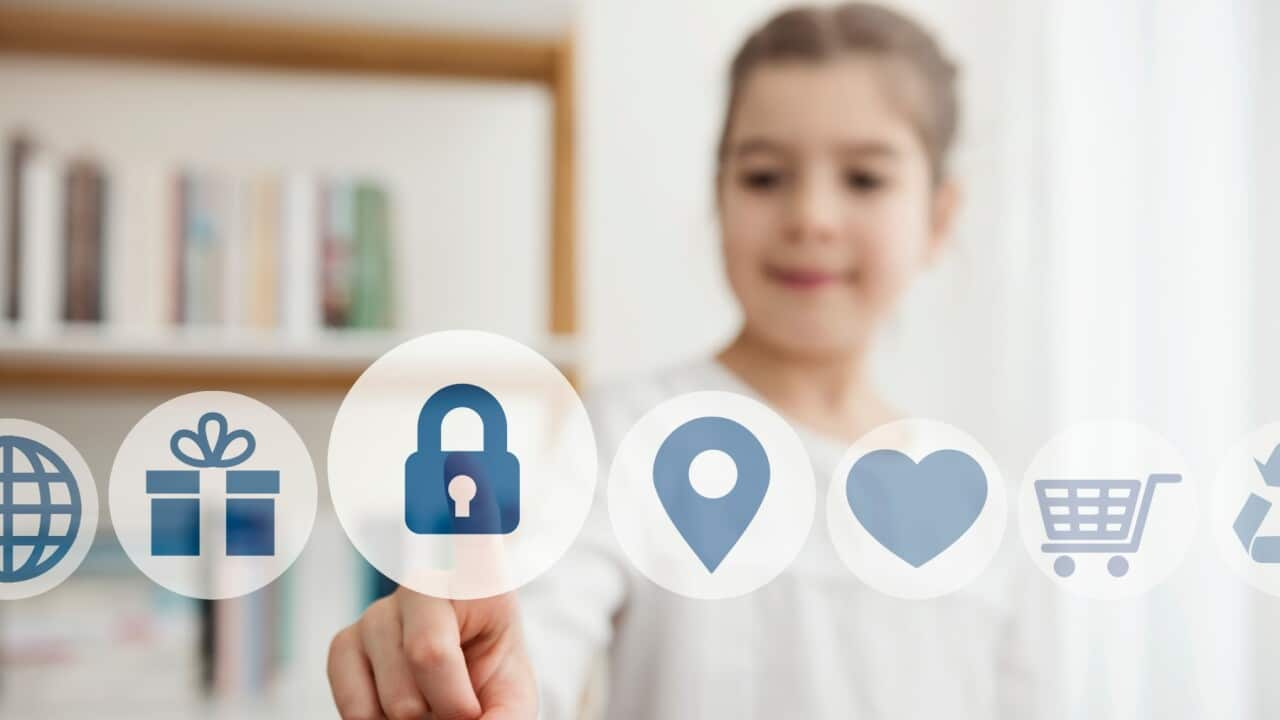In a world that is more connected today then ever before, thanks to the internet, people can access entertainment, information, education, shopping… almost everything, from the comfort of their home.

Siv lub CyberParent app los pov puag kom koj tej me nyuam tau txais kev nyab xeeb thaum siv online Source: Getty Images
Keeping children safe online
With most schools teaching online and students studying at home, it’s vital for parents to be aware of the risks the internet may expose their children to, particularly cyberbullying, grooming and recruitment by extremist groups.
The Australian Multicultural Foundation has launched an app to encourage safe and healthy internet use in Australian homes. is available in 17 languages including Arabic, Somali, Chinese, Hindi, Turkish and Vietnamese.
AMF Executive Director Hass Dellal says the app is designed to teach parents how to know what their children are doing online and on social media.
CyberParent will give them the understanding they need to keep their children safe, regardless of how much they know about the Internet and how it works.
Developed in consultation with over 50 community members and organisations, the app uses interactive learning and offers practical tips on safe internet use.
Online scams
Besides the risks children face while using internet, adults also need to be careful in their use of devices that are connected via the world wide web.
According to the Australia Competition and Consumer Commission, Australians have lost over $36 million to scams in the first three months of 2020, with phishing scams being the most common followed by false billing, online shopping and identity theft scams.
Cyber Security Hub Director of Threat Intelligence Stas Filshtinskiy believes a way to spot cyber fraud is to use your common sense.
Like in a real life, if something is too good to be true, that's most probably is an attempt to defraud you.
Generally speaking, it’s good to approach any online deals and offers with a healthy scepticism.
Be vigilant with online payments
Millions of credit card payments are processed online every day.
The Australian Payments Network (APN) latest report shows that while overall card fraud has declined, using stolen card details to make purchases accounted for 86 per cent of all fraud on Australian cards.
APN Chief Executive Andy White says the framework to mitigate card fraud involves a whole-of-industry approach involving all stakeholders, including online shoppers.
Only provide your card details on secure and trusted websites. Look for the locked padlock icon and be wary of offers that look to good to be true.
Andy White explains that malware and phishing attacks are becoming increasingly sophisticated, so all unsolicited emails and text messages from people we don’t know should be treated with suspicion. He advises not to click on the link attached and never provide confidential data such as password.

The COVID-19 crisis has seen a rise in internet users and digital connectivity. Source: Getty Images
Secure your computer
You can secure your server by seeking expert advice from a trusted supplier, restrict the number of administrator passwords and consider using a hardware firewall for your server.
Regularly back-up server data and keep back-up data secure and only available to authorised personnel.
It’s also advisable to keep current with your software and virus protection.
Secure your internet connection
Your internet connection is a channel from the outside world into your computer. If it isn't secured properly someone may use it to get to your information or hijack your connection or computer for their own purposes.
You can help harden protection for these connections by measures such as changing the default administrator (admin) password for the device and ensuring remote management is disabled.
Do not share your password
Try to create strong passwords and don't share them with anyone.
A random combination of numbers, letters and punctuation over eight characters long is recommended.

Source: Getty Images
Remember, do not use the same password for every account you may have and keep your passwords and pin numbers in a safe place.
Do not download files from unknown sites
Likewise, do not open suspicious texts, pop-up windows or emails – it's always a good idea to delete them.
Protect your mobile device
It's important to keep your mobile device with you all the time.
If your mobile device is unsecured and it’s lost or stolen, then it could be easily used to access your money or to steal your identity by using information on your device.
Protect your personal information and privacy
Treat your personal information as you would treat your money - don't leave it lying around for others to take. With your stolen identity, a person may access your bank account, obtain credit cards or loans in your name, or claim welfare benefits, and potentially ruin your credit rating – explains cyber-crime expert from The University of Canberra Nigel Phair.
With your stolen identity, a person may access your bank account, obtain credit cards or loans in your name, or claim welfare benefits, and potentially ruin your credit rating – explains cyber-crime expert from The University of Canberra Nigel Phair.

Source: Getty Images
Often people don't realise something malicious has happened until they get a bad credit rating from financial institutions.
How to get help?
The Australian Competition and Consumer Commission (ACCC) is a good place to start.
They provide up-to-date information on the most common types of scams in circulation in Australia and they also collect and publish data on them.
Here you can find a and useful sites compiled by the ACCC to help you understand, recognise and avoid scams.
If you believe some of your privacy has been breached, you can contact the Office of the Australian Information for assistance on 1300 363 992.
And don’t forget to check the list of current online threats on the government’s.







